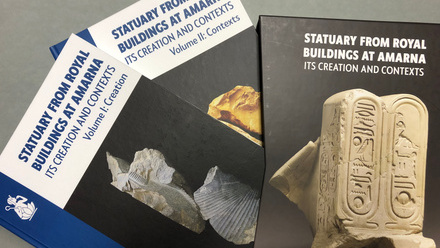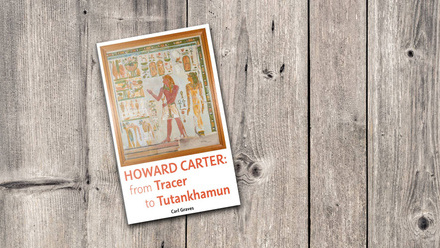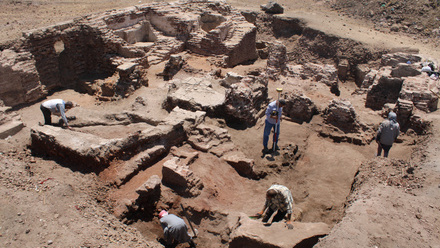The Northern Cemeteries of Amarna
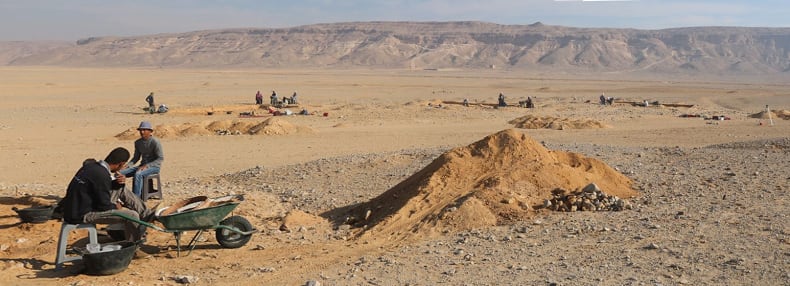
A view across one of the Amarna cemeteries (the North Desert Cemetery) during excavations in late 2018. The North Tombs of Akhenaten’s officials are cut into the distant cliff face.
Although Amarna is best known as a settlement site, it also preserves a number of large pit-grave cemeteries for the non-elite citizens of Akhetaten, containing in excess of 10,000 burials. These offer remarkable research potential: few ancient burial grounds anywhere in the world are as short-lived, closely dated and as connected to their original urban setting.
The project to investigate the Amarna cemeteries began in 2005, and is currently directed by Anna Stevens (University of Cambridge/Monash University) and Gretchen Dabbs (Southern Illinois University). It runs with the kind permission and support of the Egyptian Ministry of Antiquities. Researchers with varied specializations work together at Amarna to study the graves, human remains, burial containers and grave goods of the people of ancient Amarna. The project has produced one the largest well-excavated assemblages of burial remains from ancient Egypt and offers unique insight into health in ancient cities, non-elite funerary practice in ancient Egypt and life under Akhenaten.
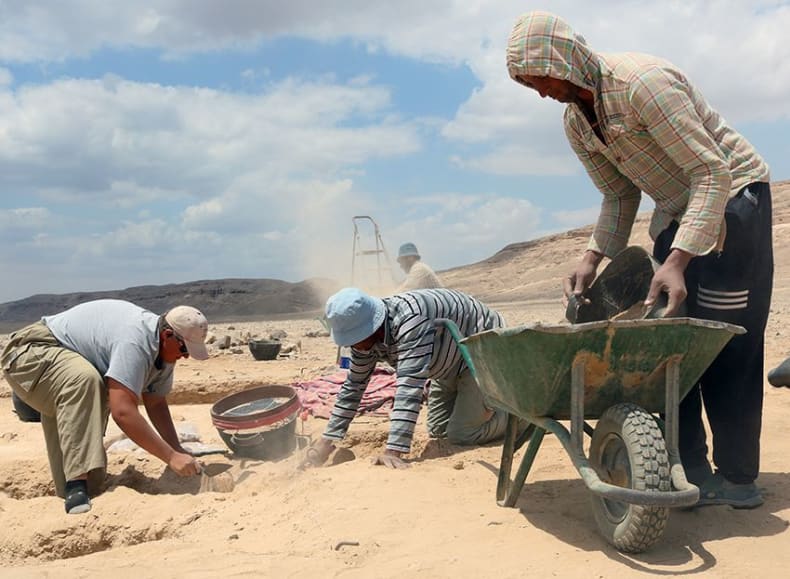
Excavations underway at the North Cliffs Cemetery in early 2018, as Gretchen Dabbs, Waleed Mohamed Omar and Ahmed Sayed Nasser clear sand to expose an ancient grave.
The first phase of the Cemetery Project ran from 2005–13 and focused on a large pit-grave cemetery beside the South Tombs (the ‘South Tombs Cemetery’). This burial ground contains around 6000 graves, over 400 of which were excavated. In addition to insight into the health and working lives of the Amarna non-elite, the South Tombs Cemetery produced several decorated wooden coffins that shed light on funerary belief under Akhenaten; study and conservation of the coffins was generously supported by an EES Fieldwork and Research Grant. The final report on the South Tombs Cemetery excavations is in an advanced state of preparation.
The second phase of the project began in 2015, funded initially by a National Endowment of the Humanities grant. It has seen a shift in focus to the northern end of Amarna, where three pit-grave cemeteries are located near the North Tombs:
North Tombs Cemetery: c. 3,500–5000 people are buried here, of which a sample of c. 231 individuals was excavated in 2015 and 2017. The vast majority of the excavated sample was between 7–25 years of age at the time of death. The restricted age range of the population, along with widespread evidence of hard working lives, has prompted the preliminary suggestion that they were labourers.
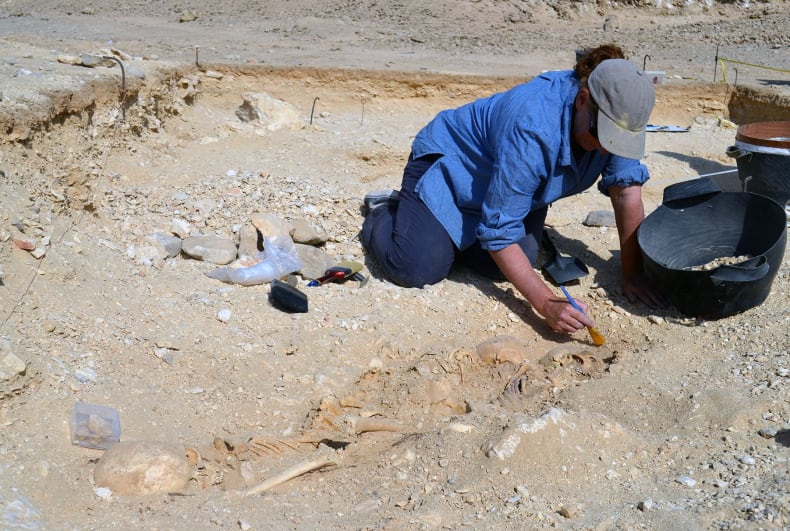
Wendy Dolling exposes a burial of three subadults at the North Tombs Cemetery in 2017.
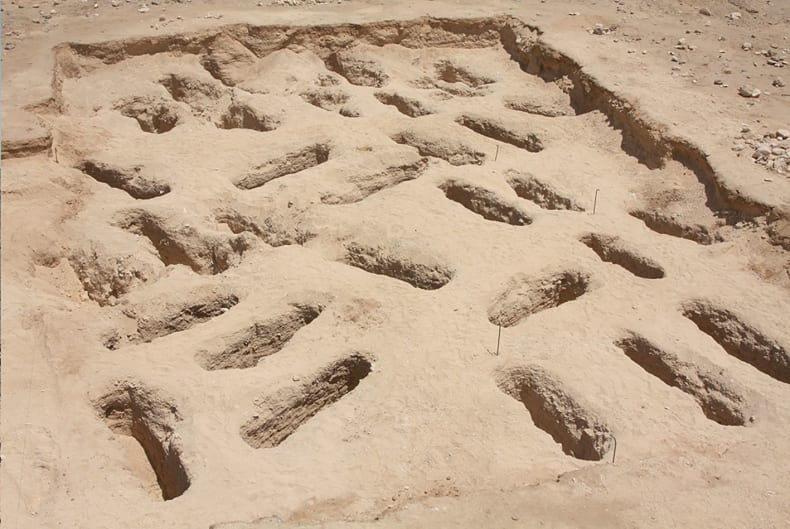
A group of closely packed graves cut into the desert surface at the North Tombs Cemetery.
North Cliffs Cemetery: c. 900–1400 individuals are buried here, of which a sample of 48 was excavated in Spring 2018. The cemetery lies below the Tomb of Panehesy, the ‘chief servitor’ in the cult of the Aten, and can be tentatively posited to be a burial ground for individuals who worked for Panehesy or other North Tombs officials.
North Desert Cemetery: This small cemetery is located c. 600 m west of the North Cliffs Cemetery. It is likely to contain only a few hundred individuals, but is unusual for containing both pit graves and heavily robbed shaft-and-chamber tombs, the latter on a low desert plateau. A first season of excavation was held here in Autumn 2018, with a sample of 24 individuals recovered.
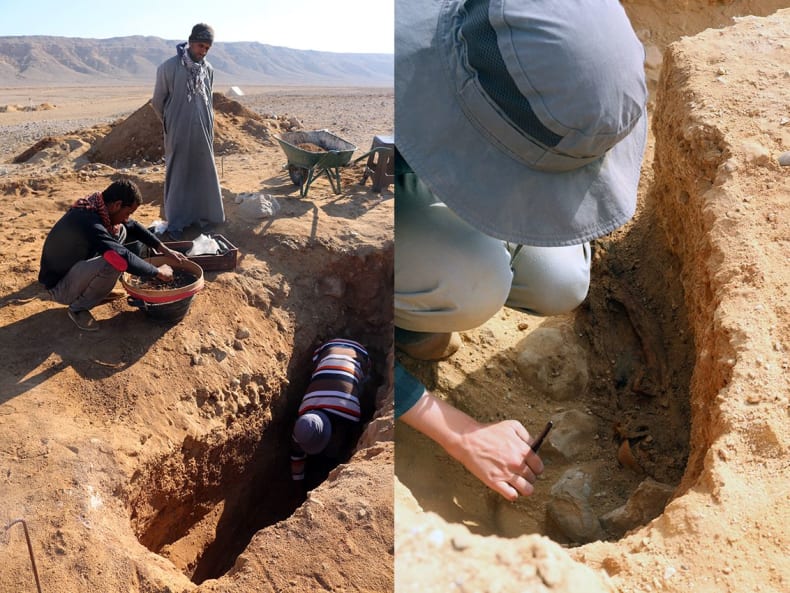
Excavations underway at the North Desert Cemetery in late 2018. Left: Nasser Mohamed Sayed, Mohamed Hosni Osman and Mohamed Mahmoud clear a deep grave pit with the damaged remains of a wooden box coffin in its base. Right: Sarah Ricketts investigates an infant burial, its base lined with stones.
Further excavations are needed at both the North Desert and North Tombs Cemeteries to increase the sample of excavated graves and allow us to gain a more in depth understanding of these two sites. In addition, considerable post-excavation work remains to record the skeletons, artefacts, body wrappings/containers and hairstyles of the individuals buried in these cemeteries.
We are delighted to have been awarded an EES Fieldwork and Research Grant to enable us to undertake a season of post-excavation work in 2019 and look forward to sharing its results.
Further reading on the Northern Cemeteries
Anna Stevens and Gretchen Dabbs, 2018. The North Tombs Cemetery excavations and skeletal analysis, Journal of Egyptian Archaeology 103, 1-13.
Anna Stevens, 2018. Death and the city: The cemeteries of Amarna in their urban context. Cambridge Archaeological Journal 28, 103–26.
And reports on the Amarna Project webpage: http://www.amarnaproject.com/pages/recent_projects/excavation/northern_cemeteries/

